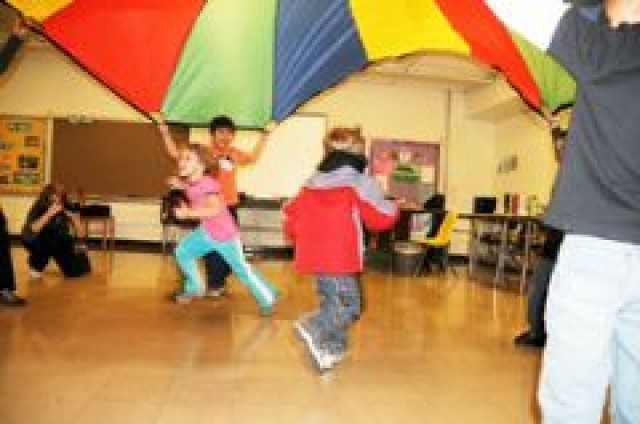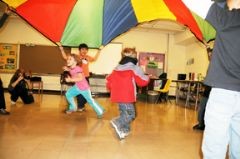
FORT RILEY, Kan. - It was a day of learning, a day of sharing and a day of coping for nearly 160 Fort Riley children attending Camp COPE Dec. 6 at Fort Riley Middle School. The day camp, founded by Elizabeth Reep, a military spouse and licensed clinical social worker from Texas, and her friend, Sarah Bravo, a licensed professional counselor, is based on the principles of courage, optimism, patience and encouragement and is designed to help children of deployed, injured and fallen servicemembers cope with the effects of war. Fort Riley was the fifth camp offered since Camp COPE began nearly three years ago and was the biggest camp yet, Bravo said.
"The support here has been overwhelming. Just the Families that are interesting in attending to the community support and the open arms we received being here," she said. Throughout the day, children attending the camp were provided age-appropriate therapeutic activities in small groups of their peers, who have had similar experiences. Some of the activities the children, ages 4 to 17, participated in included Parachute, Crystal Ball, Rose-Colored Shades, Dog Day Disaster, Ice Breakers, Big Bowl of Feelings and Act It Out. Each activity was designed to teach coping skills, which can be either directly or indirectly, depending on the child\'s comfort level.
The concept of one of the activities, the Parachute, was to teach the children how to do things differently, Bravo said, by first throwing the parachute up into the air with both hands, then throwing it up with one hand behind their back. "It's a very good deployment activity, because the parent left at home has to learn how to do things differently, so it's teaching the kids to have empathy for that Family member," she said. During another activity, Rose-Colored Glasses, children were instructed to put on their sunglasses when they had a negative feeling or thought. The children then had to come up with a positive thought to counteract the negative one.
One example of this, Bravo explained, is saying, "I hate homework." "So I put my glasses on. Then I have to find something positive about it like, 'Well, homework makes me smarter,'" she said. "They are learning about being pessimistic and optimistic."
In counselor Amy Tindell's class, children, all of whom have had a parent injured in war, participated in an activity called Crystal Ball. During the activity, the children were instructed to write down the bad things that have happened to them and then good things they wished for in the future. The pieces of paper were then inserted into snow globes for the children to take home with them. While one girl in the class said she hoped she would become a prom queen forever and ever, 10-year-old Tanner Long said he hoped his stepfather would begin to feel better and less angry about the explosion in Iraq that took both his legs and claimed the life of his best friend. "Maybe my dad won't be so mad about the accident, and maybe he'll get better," Tanner said. Tanner attended the camp upon the recommendation of his stepfather and said he had already made several friends throughout the day.
"The part that really brings them together is knowing they're in a group with kids their own age going through similar experiences," Bravo said. "It's kind of an instant bonding. And the counselors are great at facilitating that kind of a group cohesiveness, building those relationships for the kids." Although she is not connected to the military, Bravo said she can relate to military Families because of her own experience growing up with a father in the oil business and moving all over the world. "We moved around a lot and lived overseas. I did third grade three times in three different cities in three different states. I know what the Families are experiencing," she said.
"If one child goes home today and is better from being here, that's our goal. Obviously we'd love all of them to feel that way. Just from seeing them interact and hearing their voices in the rooms, they're getting that. They're learning its okay to talk about their feelings and they're learning appropriate ways to share their feelings and express themselves. That's our goal."
In addition to the Camp COPE staff, others who helped ensure the event's success at Fort Riley included Denise Ott, director of the Junction City Military Affairs Council; Clessie LeMay, formerly of Fort Riley and spouse of Lt. Col. Chad LeMay, an instructor at the Command and General's Staff College, Fort Leavenworth; along with USD 475, local volunteers and donations from local businesses and the community.

Social Sharing